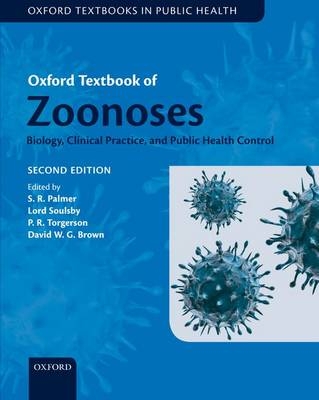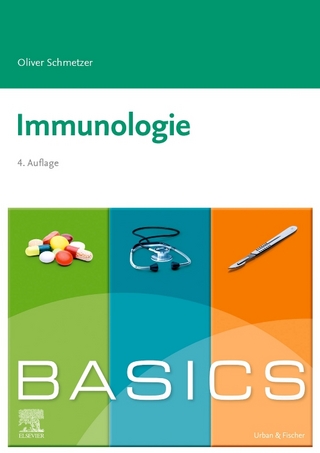
Oxford Textbook of Zoonoses
Oxford University Press (Verlag)
978-0-19-857002-8 (ISBN)
- Titel ist leider vergriffen;
keine Neuauflage - Artikel merken
Professor Palmer is one of the UK's leading public health figures. He is the former Regional Epidemiologist for Wales and was appointed to the Mansel Talbot Chair in Epidemiology and Public Health at the former University of Wales College of Medicine in 1998. He has led field investigations of many zoonoses outbreaks and has published widely on communicable disease control. In addition to being Head of Department of Epidemiology, Statistics and Public Health at Cardiff University, in April 2003, he joined the new UK Health Protection Agency initially as the founding director of the Chemical Hazards and Poisons Division and Director of the HPA's, Local and Regional Services. Then he was Head of Profession for Epidemiology until June 2010. On 1st July 2010 Professor Palmer was been appointed Cardiff University's first Archie Cochrane Chair in Epidemiology and Public Heath. Lord Soulsby was previously Professor of Animal Pathology at the University of Cambridge, UK from 1978 to 1993, and Professor of Parasitology at the University of Pennsylvania, Philadelphia, USA from 1964 to 1978. Prior to his current position at the Institute of Parasitology of the University of Zurich, Paul Torgerson was a lecturer in Parasitology at the University College Dublin and a research fellow at Cambridge University. He holds a degree in veterinary medicine and a PhD in parasitology, both awarded by the University of Cambridge. He is also a diplomat of the European College of Veterinary Public health.
PART 1: INTRODUCTION ; 1. The global challenge of zoonoses control ; 2. Deliberate release of zoonotic agents ; 3. Veterinary and human health surveillance and risk analysis of zoonoses in the UK and Europe ; 4. Health impact assessment and burden of zoonotic diseases ; 5. Antimicrobial resistance: animal use of antibiotics ; PART 2: BACTERIAL, CHLAMYDIA, AND RICKETTSIAL ZOONOSES ; 6. Anthrax ; 7. Brucellosis ; 8. Verocytotoxin-producing Escherichia coli (VTEC) infections ; 9. Lyme borreliosis ; 10. Tick borne rickettsial diseases ; 11. Flea borne rickettsial diseases ; 12. Epidemic and murine typhus ; 13. Scrub typhus ; 14. Listeriosis ; 15. Mycobacterioses ; 16. Campylobacteriosis ; 17. Chlamydiosis ; 18. Q fever ; 19a Other bacterial diseases: Diseases caused by corynebacteria and related organisms ; 19b Other bacterial diseases: Anaplasmosis, ehrlichiosis and neorickettsiosis ; 19c Other bacterial diseases: Pasteurellosis ; 19d Other bacterial diseases: Rat-bite fevers ; 19e Other bacterial diseases: Streptococcosis ; 19f Other bacterial diseases: Cat-scratch disease ; 19g Other bacterial diseases: Erysipeloid ; 19h Other bacterial diseases: Staphylococcal zoonosis ; 20. Leptospirosis ; 21. Yersiniosis and Plague ; 22. Glanders ; 23. Salmonellosis ; 24. Tularaemia ; PART 3: VIRAL ZOONOSES ; 25. Arenaviruses ; 26. Crimean-Congo haemorrhagic fever ; 27. Foot-and-mouth Disease, Vesicular Stomatitis, Newcastle Disease, and Swine Vesicular Disease ; 28. Hantaviruses ; 29. Herpes B virus (Cercopithecine Herpes 1) ; 30. Influenza ; 31. Marburg and Ebola viruses ; 32. Mosquito-borne arboviruses ; 33. Poxviruses ; 34. Prion-protein-related diseases of animals and man ; 35. Rabies and rabies-like viruses ; 36. Rift Valley fever ; 37. Tick-borne encephalitides ; 38. Yellow fever ; 39. Severe acute respiratory syndrome (SARS) ; 40. Zoonotic paramyxoviruses ; 41. Hepatitis E virus: Animal reservoirs and zoonotic risk ; PART 4: PARASITIC ZOONOSES ; 42. African trypanosomosis ; 43. American trypanosomosis (Chagas disease) ; 44. The Leishmanioses ; 45. Giardia infections ; 46. Cryptosporidiosis ; 47. Toxoplasmosis, sarcocystosis, isosporosis, and cyclosporosis ; 48. Babesiosis and malaria ; 49. Microsporidiosis ; 50. Blastocystosis ; 51. Cysticercosis and taeniosis: Taenia solium, Taenia saginata and Taenia asiatica ; 52. Other adult and larval cestodes ; 53. Cystic echinococcosis ; 54. Alveolar echinococcosis (Echinococcus multilocularis) and neotropical forms of echinococcosis (Echinococcus vogeli and Echinococcus oligarthrus) ; 55. Zoonotic schistosomiosis ; 56. Other trematode infections ; 57. Strongyloidosis ; 58. Capillariosis ; 59. Angiostrongylus cantonensis and human angiostrongylosis ; 60. Zoonotic infections with filarial nematodes ; 61. Trichinellosis ; 62. Zoonotic hookworm infections ; 63. Anisakiosis (Anisakidosis) ; 64. Toxocarosis ; 65. Trichostrongylidosis ; 66. Scabies and other mite infections ; 67. Flea infestations ; 68. The Myiases ; 69. Histoplasmosis ; 70. Zoonotic infections with dermatophyte fungi ; 71. Occasional, miscellaneous, and opportunistic parasites and fungi ; 72. Fasciolosis
| Erscheint lt. Verlag | 14.7.2011 |
|---|---|
| Reihe/Serie | Oxford Textbooks in Public Health |
| Zusatzinfo | 94 black and white line drawings, 107 black and white halftones and an 8-page colour plate section |
| Verlagsort | Oxford |
| Sprache | englisch |
| Maße | 234 x 281 mm |
| Gewicht | 2742 g |
| Themenwelt | Studium ► Querschnittsbereiche ► Infektiologie / Immunologie |
| Studium ► Querschnittsbereiche ► Prävention / Gesundheitsförderung | |
| Veterinärmedizin ► Klinische Fächer | |
| ISBN-10 | 0-19-857002-3 / 0198570023 |
| ISBN-13 | 978-0-19-857002-8 / 9780198570028 |
| Zustand | Neuware |
| Haben Sie eine Frage zum Produkt? |
aus dem Bereich


